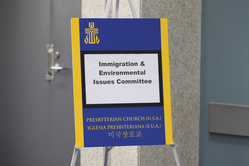A new immigrant advocacy group within the Presbyterian Church (U.S.A.) would be recognized if the 221st General Assembly (2014) adopts a recommendation from the Committee on Immigration and Environmental Issues.
The recommendation, approved Monday by a vote of 49-8, recognizes a new grassroots group, the Presbyterian Immigrant Defense Initiative, and directs the Office of the General Assembly to facilitate the group’s efforts. That responsibility would fall to a vacant position the office is seeking to fill.
The action stems from an overture from the Presbytery of Central Florida. Supporters said it was written earlier this year during a gathering of immigration reform advocates at Stony Point Center in New York.
One of the overture’s writers, Teaching Elder Howard Dotson of the Presbytery of Nevada, told the committee the Presbyterian Immigration Defense Initiative is looking to develop response teams that will act when the well being of immigrants is threatened. “We’re looking at a (Presbyterian Disaster Assistance) model response when a flashpoint happens,” he said. “We can go in and be a resource.”
While previous assemblies have called for immigration reform, this action would take the additional step of encouraging Presbyterians to work together in efforts that directly protect the civil liberties of immigrants.
“We can support a community where there is a lot of potential for hate crimes” or when authorities engage in harsh actions, Dotson said.
Lilia Ramirez-Jimenez, an overture advocate from the Presbytery of Palisades, said the detention centers where undocumented immigrants are held can be inhumane. “We are talking about people in this country who need better treatment, to be treated as human beings,” she said.
Speaking during the open hearing on the overture, Teaching Elder Parrish Jones, an overture supporter from the Presbytery of St. Augustine, said action is necessary because of Congress’s inability to pass comprehensive immigration reform legislation. Approximately 2 million people have been deported over the past seven years, Jones said.
“The focus (of the overture) is on persons threatened with deportation or by criminal or judicial action against them either if they crossed the border without documents or if they overstayed their visa,” Jones said, adding they typically encounter difficulties not because they are in the violation of the law, but because they break an administrative rule.
Committee member Steven Atkinson, a ruling elder commissioner from the Presbytery of Kendall, was concerned the recommendation would be misperceived in the church. “Some will see it as approving illegal immigration, but I don’t think that is our purpose and it could cause a backlash in our church,” he said.
He proposed an amendment that said the “adoption of this overture does not encourage or endorse the breaking of the laws of the United States of America by entering the country without legal authorization.” The amendment failed by a wide margin.

